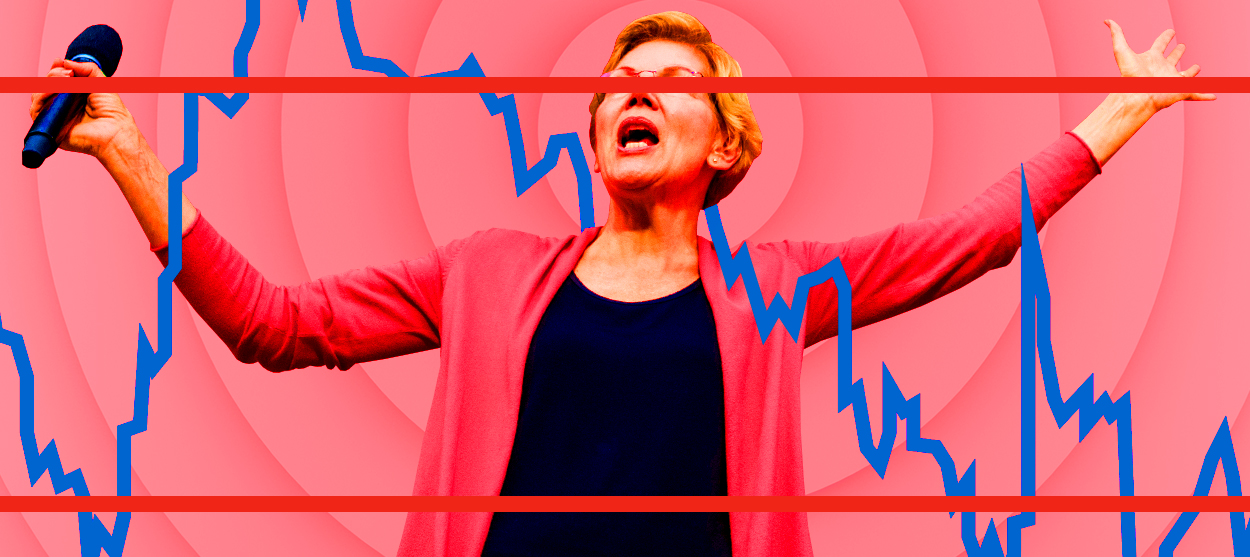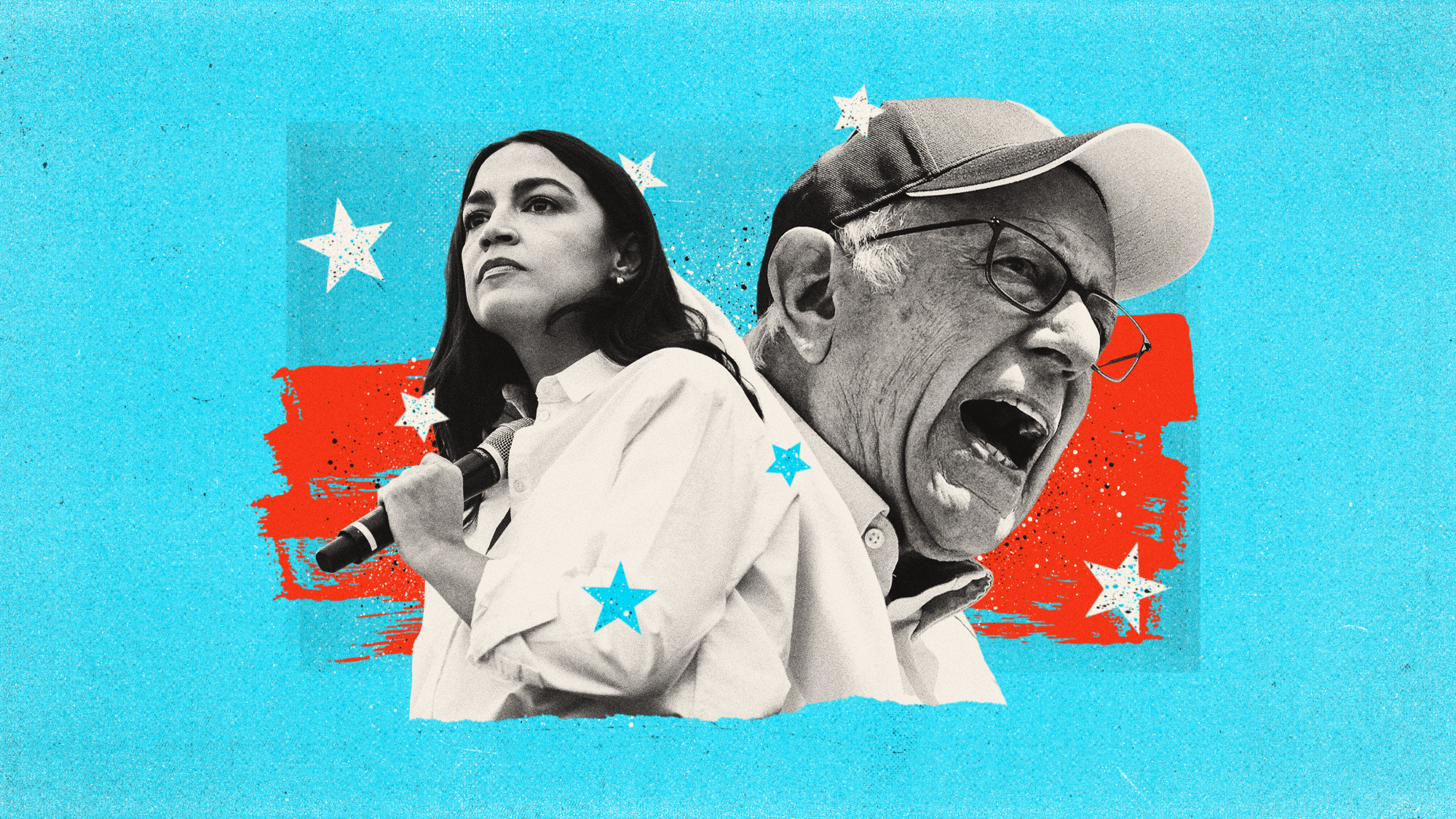Does Wall Street fear Elizabeth Warren even more than Bernie Sanders?
The Massachusetts senator's rising campaign has seemingly set off a panic


A free daily email with the biggest news stories of the day – and the best features from TheWeek.com
You are now subscribed
Your newsletter sign-up was successful
Wall Street, it seems, loathes Elizabeth Warren. Brewing panic has reportedly set in among the financial powers-that-be as the Massachusetts senator and contender for the Democratic Party presidential nomination rises in the polls. "She's got to be stopped," one executive apparently said. And Democratic donors on Wall Street have threatened to walk away or even back President Trump if Warren is the party's nominee.
The freakout is slightly odd. Warren says she's a "capitalist to my bones." One of her opponents in the Democratic primary, Sen. Bernie Sanders (I-Vt.), is a self-identified democratic socialist who regularly rails against financial industry elites.
Could it be that Wall Street nonetheless fears a Warren presidency even more than a Sanders presidency?
The Week
Escape your echo chamber. Get the facts behind the news, plus analysis from multiple perspectives.

Sign up for The Week's Free Newsletters
From our morning news briefing to a weekly Good News Newsletter, get the best of The Week delivered directly to your inbox.
From our morning news briefing to a weekly Good News Newsletter, get the best of The Week delivered directly to your inbox.
Maybe. Wall Street's anti-Warren fever is newfound, and may simply be a reaction to recent changes on the ground. "Many bankers view Warren... as the safer presidential choice if the progressive wing wins out in the Democrats' internal war," Politico reported in July. If forced to pick between Warren and Sanders "many of them would swallow hard and take Warren." Of course, July was also when Warren was polling more or less neck-and-neck with Sanders for second place in the primary, with centrist favorite and former-Vice President Joe Biden still well out in front.
Since then, Warren has outpaced Sanders, even briefly pulling ahead of Biden in some polls. And all three are polling well ahead of Trump in hypothetical general election matchups. The ambition of her agenda has accumulated as well, complete with a wealth tax, sweeping crackdowns on lobbying and corruption, and even a proposal to jail corporate executives when their companies misbehave.
That Warren is now in Wall Street's crosshairs may be about them finally taking her seriously as a threat, as much as anything.
It also matters who on Wall Street you ask. Back in February, Vox's Emily Stewart spoke to more than a dozen investors and fund managers, and several told her they'd take Trump over Warren. But Stewart also drilled down a level or two in the Wall Street hierarchy, and found that among mid-level people (who are still very well off) pro-Warren sentiment ticks up noticeably.
A free daily email with the biggest news stories of the day – and the best features from TheWeek.com
These stories are also basically collections of anecdotes curated by reporters after calling a bunch of random people. It's hardly scientific.
But it is possible to tell a concrete story for why Wall Street might find Warren uniquely troublesome.
A common view of Sanders is that, practically speaking, he's a social democrat in the model of the Nordic countries, where taxes are significantly higher to finance much larger welfare states, but markets and capitalists are otherwise left alone to do as they will. These are caricatures of both Sanders and the Nordic countries. But in U.S. politics, caricatures can do a lot of work.
In contrast to those caricatures, Warren is seen as a regulator. She may well hike taxes and expand the welfare state too, but remaking the internal rules of how companies operate is where her heart truly lies. As a candidate, Warren is uniquely concerned with the design of firms and the other institutions of Americans' economic and political life: How the process of decision-making occurs, and who has a voice in that process. "That's also why some Wall Streeters are so concerned about her," Stewart wrote. "They know how the system works and they know she knows, too."
Frankly, what wealthy capitalists and titans of industry arguably like even more than making money is wielding power: running their economic fiefdoms as they see fit, giving their orders, and knowing they will be followed. Those are precisely the privileges that Warren threatens to strip from them.
Warren was the creative force behind the Consumer Financial Protection Bureau (CFPB), the agency was tasked with rooting out predatory practices in financial services, and laying down rules for what sort of products companies can and can't offer. That fight not only earned her the wrath of Republicans, but of pro-Wall Street members of the Obama administration. She's called for a big expansion of financial industry regulations, and even fought (and won) against Obama's effort to appoint Larry Summers to the Fed.
Warren once went head-to-head with Biden over how to set the rules for who can declare bankruptcy, when, and under what conditions. The rest of her agenda would remake the way corporations have to bargain with unions, force stockholders to share company governing power with workers, crackdown on the private equity industry, and more. Warren wants to use revitalized antitrust law to bust up tech giants and other corporate behemoths.
As The Prospect has documented, a Democratic president would actually be able to enact enormous change through the regulatory state alone, even if their legislation is stymied by congressional Republicans — a tool Warren seems almost uniquely equipped, in both temperament and expertise, to exploit.
"Unlike universal health care or increased spending on the poor, Warren's proposal is to fundamentally upend the way the most productive companies in the American economy work from the top down," Samuel Hammond, a libertarian policy writer who's a fan of the Nordic model precisely because he views it as market-friendly, wrote in August. He did not mean it as a compliment.
Think of it this way: If you're a Wall Street tycoon, what would you hate more? A big tax hike? Or a policymaker actually telling you how you may and may not run your empire? Or, even worse, telling you that you're not really in charge any more — that you must share democratic power with those beneath you?
Does this mean liberals and progressives should actually prefer Warren over Sanders? Not necessarily.
One advantage of having two ambitious left-wingers in the Democratic primary is they keep trying to one-up each other, and Sanders' and Warren's agendas have converged as the primary has gone on. Even if Warren doesn't win the presidency, she'd still have a perch of enormous influence in the Senate from which to press for her agenda — and vastly more chance of passing it with a sympathetic President Sanders in the White House. The same point would apply if Warren wins the presidency and Sanders remains in the Senate.
But the terror and fury Warren's rise has provoked on Wall Street is also a useful reminder: A truly just and progressive society cannot simply treat capitalism's internal mechanics as a black box, redistributing money on the backend via taxes and transfers. It must go into the guts of how markets and firms are run, and redistribute power there as well.
Want more essential commentary and analysis like this delivered straight to your inbox? Sign up for The Week's "Today's best articles" newsletter here.
Jeff Spross was the economics and business correspondent at TheWeek.com. He was previously a reporter at ThinkProgress.
-
 Health insurance: Premiums soar as ACA subsidies end
Health insurance: Premiums soar as ACA subsidies endFeature 1.4 million people have dropped coverage
-
 Anthropic: AI triggers the ‘SaaSpocalypse’
Anthropic: AI triggers the ‘SaaSpocalypse’Feature A grim reaper for software services?
-
 NIH director Bhattacharya tapped as acting CDC head
NIH director Bhattacharya tapped as acting CDC headSpeed Read Jay Bhattacharya, a critic of the CDC’s Covid-19 response, will now lead the Centers for Disease Control and Prevention
-
 The billionaires’ wealth tax: a catastrophe for California?
The billionaires’ wealth tax: a catastrophe for California?Talking Point Peter Thiel and Larry Page preparing to change state residency
-
 Mamdani vows big changes as New York’s new mayor
Mamdani vows big changes as New York’s new mayorSpeed Read
-
 Bari Weiss’ ‘60 Minutes’ scandal is about more than one report
Bari Weiss’ ‘60 Minutes’ scandal is about more than one reportIN THE SPOTLIGHT By blocking an approved segment on a controversial prison holding US deportees in El Salvador, the editor-in-chief of CBS News has become the main story
-
 Has Zohran Mamdani shown the Democrats how to win again?
Has Zohran Mamdani shown the Democrats how to win again?Today’s Big Question New York City mayoral election touted as victory for left-wing populists but moderate centrist wins elsewhere present more complex path for Democratic Party
-
 Millions turn out for anti-Trump ‘No Kings’ rallies
Millions turn out for anti-Trump ‘No Kings’ ralliesSpeed Read An estimated 7 million people participated, 2 million more than at the first ‘No Kings’ protest in June
-
 Ghislaine Maxwell: angling for a Trump pardon
Ghislaine Maxwell: angling for a Trump pardonTalking Point Convicted sex trafficker's testimony could shed new light on president's links to Jeffrey Epstein
-
 The last words and final moments of 40 presidents
The last words and final moments of 40 presidentsThe Explainer Some are eloquent quotes worthy of the holders of the highest office in the nation, and others... aren't
-
 The anger fueling the Bernie Sanders and Alexandria Ocasio-Cortez barnstorming tour
The anger fueling the Bernie Sanders and Alexandria Ocasio-Cortez barnstorming tourTalking Points The duo is drawing big anti-Trump crowds in red states
